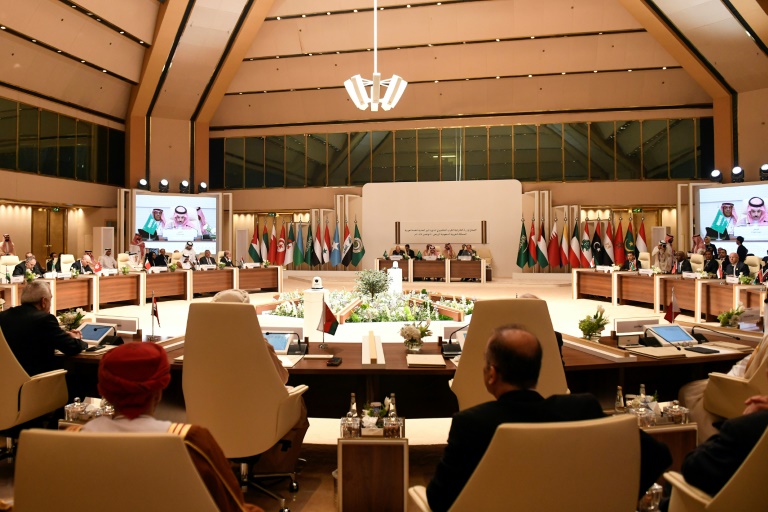Gaza in spotlight as Arab, Muslim blocs meet in Saudi

Arab foreign ministers at a preparatory meeting ahead of the extra-ordinary Arab League summit in Riyadh expected to underscore demands that Israel’s war in Gaza ends
Riyadh – Arab leaders and Iran’s president are in the Saudi capital Saturday for summits expected to underscore demands that Israel’s war in Gaza end before the violence draws in other countries.
The emergency meetings of the Arab League and the Organisation of Islamic Cooperation come after Hamas militants’ bloody October 7 attacks that Israeli officials say left about 1,200 people dead and 239 taken hostage.
Israel’s subsequent aerial and ground offensive has killed more than 11,000 people, mostly civilians and many of them children, according to the Hamas-run health ministry.
Aid groups have joined pleas for a ceasefire, warning of a humanitarian “catastrophe” in Gaza, where food, water and medicine are in short supply.
The Arab League aims to demonstrate “how the Arabs will move on the international scene to stop the aggression, support Palestine and its people, condemn the Israeli occupation, and hold it accountable for its crimes”, the bloc’s assistant secretary-general, Hossam Zaki, said this week.
But Palestinian militant group Islamic Jihad on Friday said it did not “expect anything” from the meeting, criticising Arab leaders for the delay.
“We are not placing our hopes on such meetings, for we have seen their results over many years,” Mohammad al-Hindi, the group’s deputy secretary-general, told a press conference in Beirut.
“The fact that this conference will be held after 35 days (of war) is an indication of its outcomes.”
Israel and its main backer the United States have so far rebuffed demands for a ceasefire, a position that is expected to draw heavy criticism during Saturday’s meetings.
A united “diplomatic front… will generate diplomatic pressure from Arab and Muslim states,” said Saudi analyst Aziz Alghashian.
Criticism from regional leaders so far indicates “that this is not just about Israel-Palestine — this is about what is facilitating Israel to do this, which is basically the United States and the West”, he added.
That clash has been on display during US Secretary of State Antony Blinken’s recent visits to the region, as well as during a stop this week in Riyadh by British Foreign Secretary James Cleverly, who met with a number of his Arab counterparts who have called for a ceasefire.
“What we have said is that calling for a ceasefire is understandable, but what we also recognise is that Israel is taking action to secure its own stability and its own security,” Cleverly said on Thursday.
“Of course we want to see this terrible situation resolved as quickly as possible. The immediate challenge is the humanitarian needs of the people of Gaza. That’s why we are focusing on that.”
– Raisi to Riyadh –
Iranian President Ebrahim Raisi’s expected attendance at the Organisation of Islamic Cooperation meeting will be his first trip to Saudi Arabia since the two Middle East heavyweights reached a surprise rapprochement deal in March, ending seven years of severed ties.
Iran backs Hamas as well as Lebanon’s Hezbollah and Yemen’s Huthi rebels, placing it at the centre of concerns the war could expand.
The conflict has already fuelled cross-border exchanges between the Israeli army and Hezbollah, and the Huthis have claimed responsibility for “ballistic missiles” the rebels said targeted southern Israel.
Analysts say Saudi Arabia feels vulnerable to potential attacks because of its close ties with the Washington and the fact that it was considering normalising ties with Israel before the war broke out.
Saudi Arabia’s de facto ruler Crown Prince Mohammed bin Salman on Friday condemned “continued violations of international humanitarian law by the Israeli occupation forces,” his first public comments on the war, though Riyadh has levelled similar criticism in multiple statements.
Kim Ghattas, author of a book on the Iran-Saudi rivalry, said during a panel organised by the Arab Gulf States Institute in Washington that “the Saudis are hoping that the fact they didn’t normalise yet, and the fact that they have a channel to the Iranians, gives them some protection.”
“And I think the Iranians are hoping that the fact that they’re in touch with the Saudis and maintaining that channel, that it gives them some protection too.”
